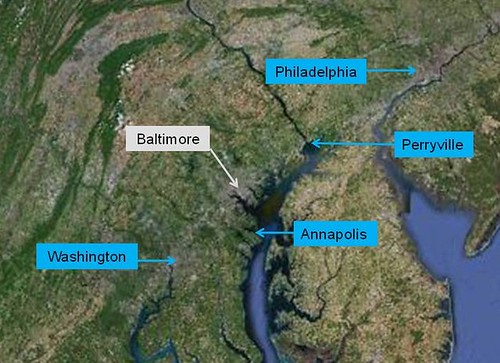Ben Butler saves Washington DC

Thanks to everyone who attended yesterday’s lecture on “Lowell and the Coming of the Civil War.” While the riot in Baltimore on April 19, 1861 which cost the lives of Luther Ladd, Addison Whitney, Charles Taylor and Sumner Needham and left two dozen of their comrades in the Sixth Massachusetts Volunteer Infantry Regiment seriously wounded was a big part of the story, the events of the following week were also discussed.
The Sixth Regiment was the first organized and fully armed military unit to pass through Baltimore in response to President Lincoln’s call for 75,000 volunteer troops to put down the rebellion. Because Baltimore was essentially a southern city, dominated by those sympathetic to the Confederates, the passage of Northern troops through town, especially those from that hotbed of abolitionism Massachusetts, was an outrage. After the Sixth Regiment made it through town, the mayor and police chief of Baltimore decided to burn the railroad bridges north of the city to prevent any more troops from arriving, something they feared would precipitate even more rioting and damage to the city. Between the civil unrest and the destroyed bridges in an around Baltimore, the primary route to Washington from New England and the Atlantic states was blocked as of the evening of April 19.
The previous day, Confederate militia had captured the US Arsenal at Harper’s Ferry, Virginia. Besides providing the Confederates with thousands of rifles that were stored there, this also blocked the primary rail route into Washington from the northwest. On April 20, Confederate forces seized the Gosport Naval Yard, now known as the Norfolk Naval Shipyard, which at the time was the main base of the United States Navy. It’s capture handed the Confederates several ships, countless cannon, and tons of gunpowder and other munitions. Confederate control of Gosport also blocked the entrance to Chesapeake Bay, which was another possible route into Washington.
Surrounded by hostile forces and almost completely cut-off from the north, Abraham Lincoln became despondent, expecting a Confederate move against Washington any day with just the Sixth Massachusetts Regiment available to defend the capitol. But Lincoln underestimated the resourcefulness of Ben Butler.
Butler had accompanied the Eighth Massachusetts Regiment which had left Boston shortly after the Sixth. The Eighth was in Philadelphia when word came of the Baltimore riot and the burning of the bridges. Butler put the Eighth Regiment on a train heading south but went only as far as the town of Perryville on the Susquehanna River. Normally, a large ferry boat would carry the train across to the south side of the river where it would continue down the track to Baltimore. This time, Butler seized the ferry, loaded the Eighth Regiment aboard, and ordered it to sail down Chesapeake Bay to Annapolis, the capitol city of Maryland.
The Massachusetts troops arrived just as pro-Southern residents were about the seize the Naval Academy, the USS Constitution (which was docked there) and government buildings in the town. Butler took control and immediately inquired into the state of the railroad that ran from Annapolis to Annapolis Junction (today’s Fort Meade) where the line joined the main Baltimore to Washington track since this route would by-pass Baltimore. Butler found that much of the track had been torn up to prevent its use and the only engine that hadn’t been moved out of town was broken-down in the repair shop. Quizzing his troops, Butler found many who were experienced at railroad construction and immediately put them to work repairing the track. He also found a private from Lynn who worked in the machine shop where the engine had been built. This guy was able to get the engine running and soon the route to Washington was open.
Butler was named the commander of the newly formed Department of Annapolis and ordered to keep this route into Washington open. He did, and by the end of April 10,000 troops had flowed down those tracks into Washington, and the threat to the nation’s capitol had passed, thanks to the resourcefulness of Ben Butler.
Thanks for a very interesting briefing. It makes one wonder how things may have been drastically different if certain events in the sequence did not happen as they did.
The beauty of history. As we construct our narrative, a stone out of place might have made the difference. Workers unable to repair a train engine, in Dick’s story yesterday, might have meant Washington was taken and the war quickly ended without an Emancipation Proclamation. John Wilkes Booth was at Lincoln’s second inaugural, was planning to murder him then, but did not. Lots of things happened before he finally did. An attempt was made on FDR’s life before he was inaugurated – it failed. Thereafter we have the First Hundred Days and the significant social/economic legislation that followed.
The trick in teaching history is how to do it in a way that contains the mystery even though we know the end of the story in many respects going in. The participants in the events we teach did not know how the story would turn out and being able to convey this is the best part of my job teaching history – as I’ve said many times before – the best job in the world next to playing left field in Fenway!
Thanks Dick for caring about history and exciting so many others to learn about Lowell and thanks Lowell Historical Society for the rich series of events coming up regarding the start of the Civil War, the War between the States, the war for Emancipation, the Northern War of Aggression – all ways to explain things depending on one’s perspective.